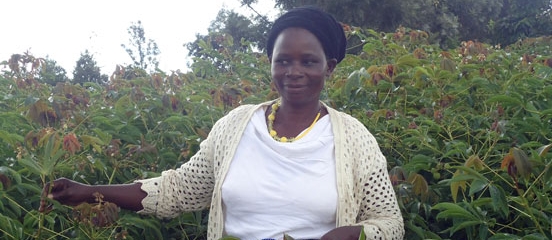Cassava recipe for healthy harvests in Kenya
08 May 2013

One of the most popular food crops across eastern Africa is maize. However, it needs plenty of rain, which in an area where dry spells and outbreaks of plant disease are frequent, means ruined harvests are not uncommon.
A great alternative to maize is cassava, which can survive in much drier conditions - it is a nutritious tuber, a little like a giant potato or yam. But, as it can take 18 months to two years to mature, many farmers are reluctant to grow it, while it is all too often ruined by diseases known locally as ‘mosaic virus’ and ‘brown streak virus’.
Disease-resistant cassava
In Kenya’s Ugenya district many families rely on growing cassava to survive as there isn’t enough rain for healthy maize harvests. But their cassava crops are being destroyed by diseases on an worryingly regular basis. Having spoken to local farmers about their problems, and having engaged them in a successful trial, Farm Africa is now introducing farmers to new cassava varieties that mature in less than a year while also resisting common plant diseases.
Gloria is just one of more than 2,000 farmers who have benefited so far. She used to rely on her small tailoring business to feed her family, while also trying to grow maize despite the low rainfall. She was previously too worried to invest time in growing cassava as she feared it would die before she could eat it.
Fast-maturing crops
With Farm Africa training, and the encouragement of other local farmers, Gloria felt confident enough to plant three-quarters of an acre with the new cassava varieties. And just 11 months later she harvested her first cassava crop. Some she used to feed her family, while she sold some cuttings to other local farmers who had heard about the new ‘wonder crop’ and wanted to try it for themselves.
She also turned some into cassava chips which fetch a good price, and is looking forward to learning other new ways to add value to her harvest.
She told Farm Africa: “My life has changed for the better since I became involved in the project.” Thanks to this extra income, she is now able to comfortably feed her family all year round and pay her children's school costs.
More about our cassava project
More about our work in Kenya
